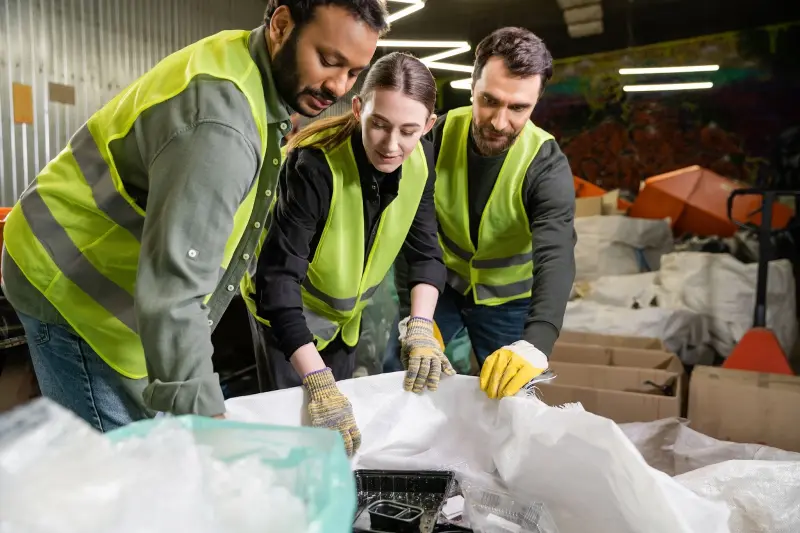Electronic waste recycling is of great importance for environmental sustainability and the efficient use of resources. Electronic waste (e-waste) includes all broken or no longer usable electronic devices such as mobile phones, computers, televisions, and household appliances. Since these wastes contain harmful chemicals and toxic substances, improper recycling can cause serious damage to both human health and the environment. Heavy metals, mercury, lead, cadmium, and other hazardous substances can seep into the soil and groundwater, negatively affecting ecosystems. E-waste recycling ensures the safe processing of these harmful substances while also allowing for the recovery of valuable metals and rare elements.
For example, precious metals such as gold, silver, and copper found in electronic devices can be reused through the recycling process. Additionally, the recycling process saves energy and reduces the consumption of natural resources needed for the production of new products. Considering that a significant amount of energy and raw materials are consumed during the production of technological devices, recycling provides both economic and environmental benefits. In conclusion, electronic waste recycling is a critical step toward a sustainable future. Raising awareness in society and increasing recycling rates are essential for achieving this goal.
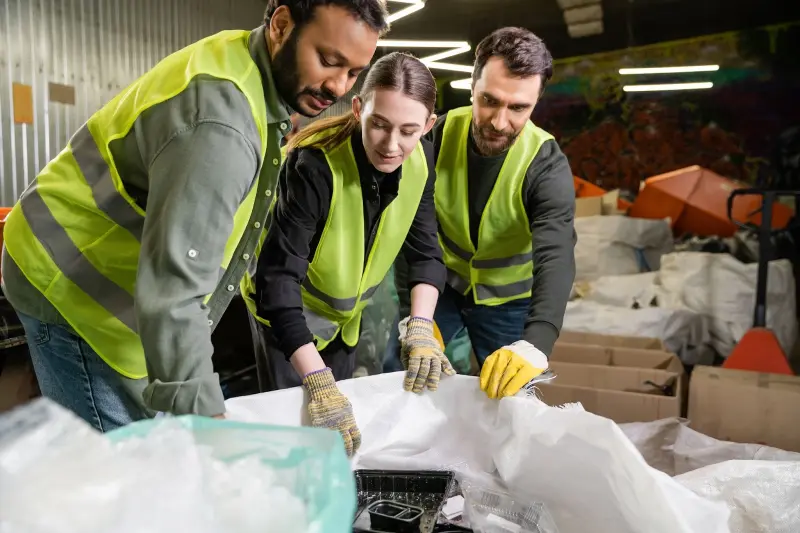
Table of Contents
· How is Electronic Waste Recycled?
· The Evaluation of Electronic Waste
· Burkasan’s Role in E-Waste Recycling
E-Waste Recycling in Turkey
E-waste recycling in Turkey has gained more importance in recent years with the increase in environmental awareness. However, further development and awareness-raising efforts are still needed in this area. The management of electronic waste in Turkey is regulated under the “Regulation on the Control of Waste Electrical and Electronic Equipment,” which came into effect in 2012. This regulation places responsibility on producers, importers, and distributors to ensure the collection, recovery, and disposal of e-waste. However, the general public’s lack of knowledge about electronic waste and the ineffectiveness of recycling systems in every region hinder the widespread implementation of this process. In Turkey, e-waste is mostly collected by municipalities, licensed recycling facilities, and some private organizations.
Recycling facilities established nationwide work on separating valuable metals and plastics from electronic waste, safely processing hazardous substances, and recovering reusable raw materials. However, a significant portion of the electronic waste collected in Turkey still ends up in landfills or is improperly disposed of. This situation can lead to environmental pollution and harm to human health. To achieve more effective results in e-waste recycling in Turkey, educational and awareness-raising efforts need to be increased, recycling systems should be expanded, and strategies like extending the lifespan of electronic products should be implemented. Moreover, collaboration between local governments and the private sector in e-waste recycling can help make the process more efficient.
One of the leading companies in e-waste recycling in Turkey is Burkasan. With its expertise in waste management and recycling, Burkasan has made significant strides in the collection, separation, and recovery of electronic waste. The company ensures the recovery of valuable metals in electronic waste while carefully managing the safe disposal of hazardous materials through its advanced facilities and sustainability-focused approach.
Burkasan operates a recycling process that complies with both national and international standards, contributing to the preservation of natural resources and the prevention of environmental pollution. In addition, Burkasan’s success in the sector is supported by a broad network of collaborations and community awareness projects. The company aims to raise public awareness about electronic waste through educational initiatives and social responsibility projects, positioning itself as one of Turkey’s leaders in the field of e-waste recycling. In this context, Burkasan continues to make significant contributions to both the industry and the environment through its steps toward a sustainable future.
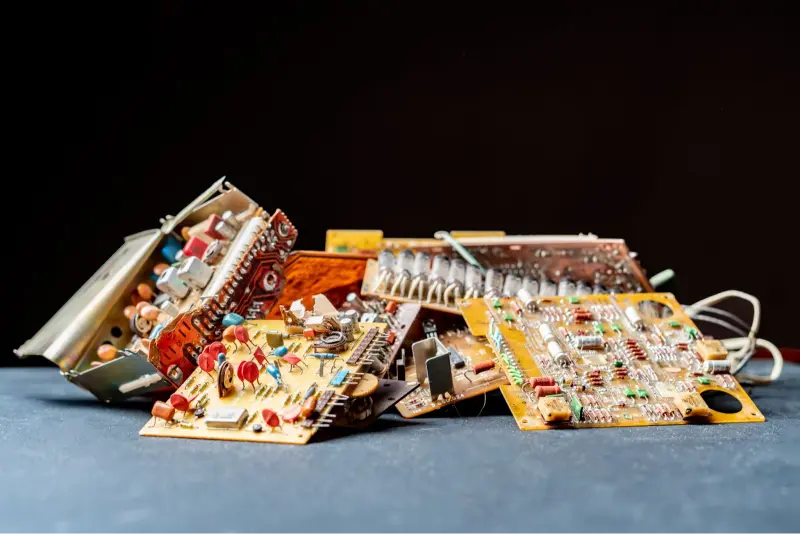
How is Electronic Waste Recycled?
The recycling of electronic waste is a complex process consisting of several stages. The first stage is the proper collection of electronic waste. Waste is delivered to collection points provided by recycling centers, licensed collectors, or municipalities. The collected electronic waste is then brought to recycling facilities, where it is first sorted according to its type. For example, devices such as computers, mobile phones, televisions, and household appliances are categorized separately. After this classification, the waste is disassembled. In other words, electronic devices are separated into their components. At this stage, different materials such as plastic casings, metal parts, circuit boards, and batteries are separated from each other.
In the next stage, hazardous materials and toxic chemicals (such as mercury, lead, and cadmium) extracted from the devices are safely separated and disposed of. This process ensures that substances that could harm the environment and human health are controlled. The remaining components are processed through various mechanical methods to be recovered. For example, metals (gold, silver, copper) and plastics are shredded and separated using special machines and turned into reusable raw materials.
Finally, the recycled materials are offered to the market as raw materials for the production of new electronic devices or for use in various industrial sectors. This process reduces the consumption of natural resources and minimizes the environmental damage caused by electronic waste. Electronic waste recycling plays an important role in resource efficiency, environmental protection, and sustainability.
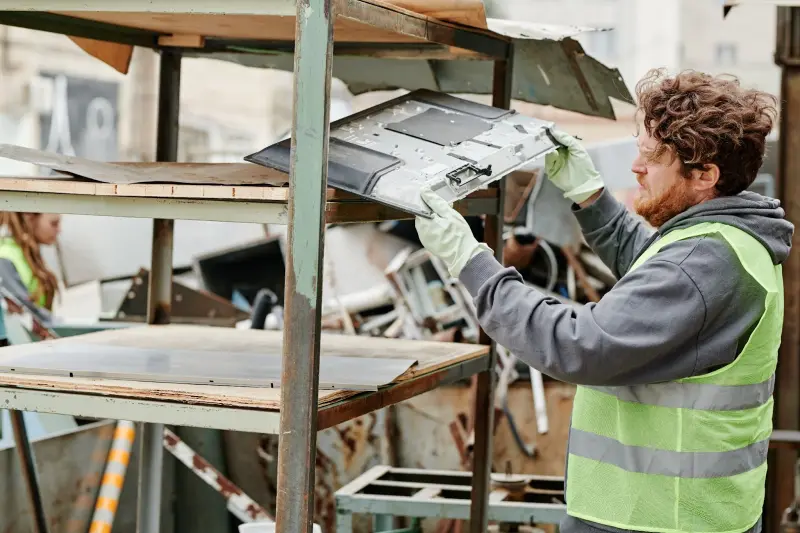
The Evaluation of Electronic Waste
When properly processed, electronic waste can provide significant benefits for both the environment and the economy. These wastes are processed through recycling methods, and the valuable raw materials they contain are recovered for reuse. Since electronic devices contain metals, plastics, glass, and various chemical components, these materials are separated during the recycling process.
Precious metals such as gold, silver, and copper can be recovered through recycling and reintroduced into industry. Additionally, plastics and glass obtained from the recycling process can be reprocessed and used in the production of various products.
Moreover, hazardous materials in electronic waste are safely disposed of using appropriate methods to prevent environmental harm. The evaluation of electronic waste contributes to resource efficiency, energy savings, and the conservation of natural resources. Therefore, delivering electronic waste to recycling facilities and ensuring the reuse of these resources is a critical step toward a sustainable environment.
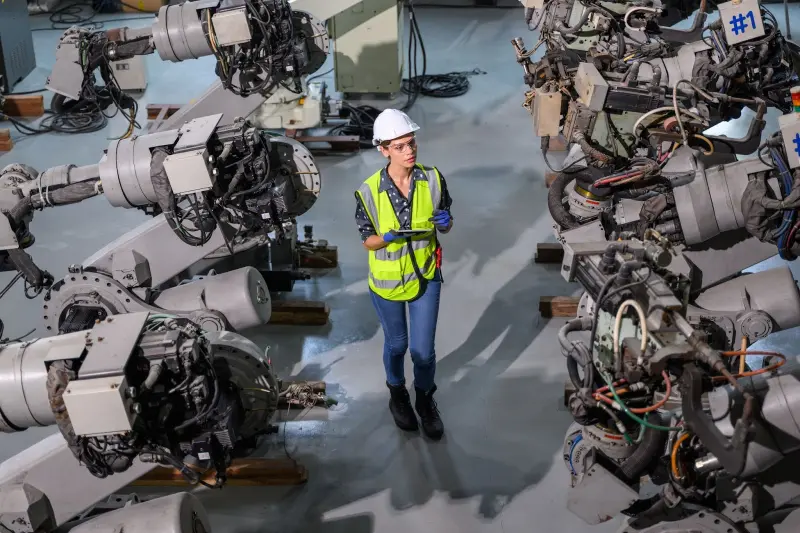
Electronic Waste Regulation
The Electronic Waste Regulation is a regulation implemented in Turkey to ensure the management, collection, recovery, and disposal of electronic waste (e-waste) without harming the environment. Officially known as the “Regulation on the Control of Waste Electrical and Electronic Equipment,” it came into force in 2012.
This regulation aims to prevent environmental pollution caused by electronic devices when they become waste after their lifespan ends and to enable the recycling of these wastes. Under the regulation, manufacturers, importers, and distributors are held responsible for contributing to the collection, transportation, and recycling processes of the waste.
Manufacturers are also required to encourage environmentally friendly designs and longer product lifespans. Additionally, systems have been established under the regulation to monitor and record the waste, while consumers are encouraged to deliver e-waste to the appropriate collection points. This regulation aims to increase efficiency in the management of electronic waste, minimize environmental damage, and ensure the sustainable use of resources.

Burkasan’s Role in E-Waste Recycling
Burkasan is one of the leading companies in Turkey in the field of electronic waste recycling, with significant achievements in this area. The company carefully manages the processes of collecting, separating, and recovering electronic waste, using advanced recycling technologies and sustainability-focused strategies to prevent environmental damage. Burkasan makes important contributions to both environmental protection and economic value creation by recovering valuable metals and plastics from e-waste for reuse.
The company also ensures the safe disposal of hazardous materials in electronic waste, preventing harm to the environment and human health. As an environmentally conscious company, Burkasan complies with the highest international standards in its recycling processes and supports educational and awareness projects to increase public understanding of e-waste. In this context, Burkasan’s success in electronic waste management continues to contribute to a sustainable future with its environmentally responsible approach and technology-driven solutions.
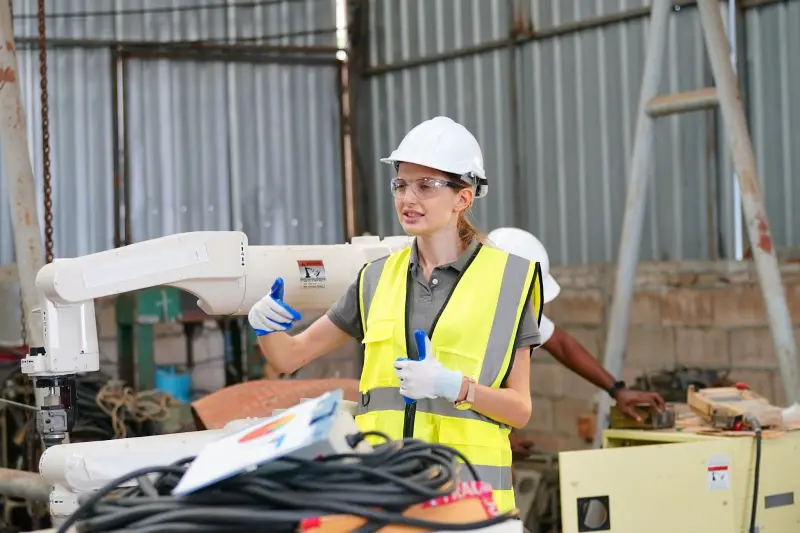
Contents
- What is electronic waste?
- Why should electronic waste be recycled?
- How is electronic waste recycled?
- Where can electronic waste be delivered?
- How does e-waste recycling benefit the environment?
- What happens if electronic waste is not recycled?
- How is e-waste recycling regulated in Turkey?
- What materials are recovered from e-waste?
- Why is e-waste recycling economically important?
- How can e-waste recycling rates be increased?
Frequently Asked Questions
1. What is electronic waste?
Electronic waste (e-waste) refers to waste generated from electronic devices that have reached the end of their lifespan or are no longer used. This includes items such as computers, mobile phones, televisions, household appliances, printers, and more.
2. Why should electronic waste be recycled?
Electronic waste contains toxic substances like mercury, lead, and cadmium. If not properly recycled, these substances can harm the environment and human health. Additionally, valuable metals such as gold, silver, and copper can be recovered and reused from e-waste.
3. How is electronic waste recycled?
Electronic waste is first collected and sorted by type. Then, the devices are disassembled, separating plastic, metal, and hazardous materials. The valuable metals are extracted using special machines, while hazardous materials are safely disposed of.
4. Where can electronic waste be delivered?
Electronic waste can be delivered to e-waste collection points set up by municipalities, licensed recycling facilities, or through electronic stores’ buy-back programs. Many organizations also organize special campaigns to collect e-waste.
5. How does e-waste recycling benefit the environment?
Recycling prevents the release of toxic substances from e-waste into the environment, reducing pollution. Additionally, by recovering metals and other materials for reuse, natural resource consumption and energy waste are significantly reduced.
6. What happens if electronic waste is not recycled?
If e-waste is not recycled, it ends up in landfills, where chemicals can leach into the soil and water sources, causing serious environmental pollution. Furthermore, valuable resources in these devices are wasted.
7. How is e-waste recycling regulated in Turkey?
E-waste recycling in Turkey is regulated by the “Regulation on the Control of Waste Electrical and Electronic Equipment,” which came into effect in 2012. This regulation holds producers and importers responsible for recycling and preventing environmental harm.
8. What materials are recovered from e-waste?
Materials such as gold, silver, copper, aluminum, as well as plastics, glass, and certain special components are recovered from e-waste. These materials are processed for reuse in the production of new products.
9. Why is e-waste recycling economically important?
E-waste recycling helps reduce the consumption of natural resources, contributing to the economy. Additionally, recovered metals and other materials lower raw material costs and save energy.
10. How can e-waste recycling rates be increased?
To increase recycling rates, public awareness must be raised, the number of recycling facilities should be increased, and consumers should be provided with easier recycling options. Educational campaigns and incentives can also support this process.

